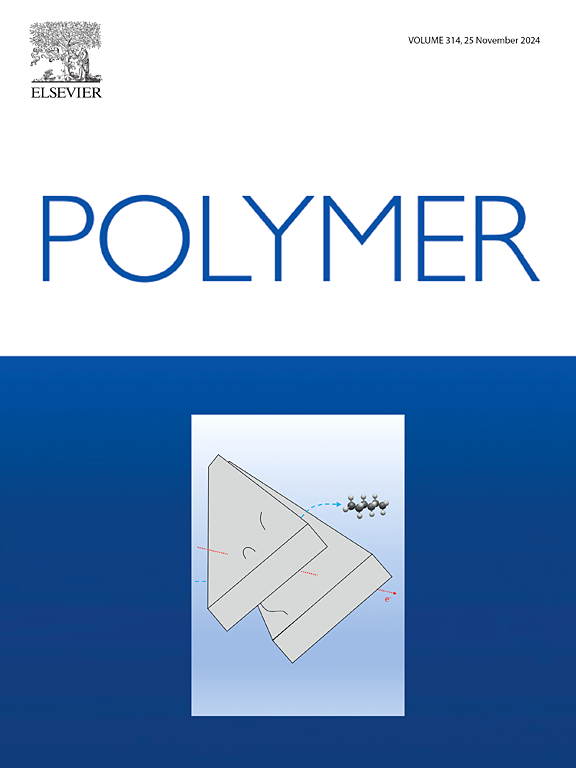用n -丁基- n -苯基苯胺基实现高玻璃化转变温度的热塑性聚酰亚胺
IF 4.5
2区 化学
Q2 POLYMER SCIENCE
引用次数: 0
摘要
热塑性聚酰亚胺具有良好的加工性能,同时又保留了热塑性聚酰亚胺的大部分优良性能,如优良的耐热性、绝缘性能、化学稳定性等。TPI可以通过结合柔性连杆和侧基来获得。然而,它会导致聚合物链柔韧或分子间相互作用减弱,从而导致热稳定性下降。在此,我们通过引入n -丁基- n -苯基苯胺基来开发具有良好热稳定性的tpi。其柔性链接- n -和扭曲结构分别有利于实现柔性聚合物链和增加自由体积,从而获得良好的热塑性。同时,n-丁基- n-苯基苯胺基团作为二胺单体中富电子的芳香基团,能够保持强电荷转移配合物(CTC)效应,有利于保持较高的热稳定性。结果表明,制备的TPI具有良好的热塑性和357℃的高Tg。本文章由计算机程序翻译,如有差异,请以英文原文为准。


Thermoplastic polyimide with high glass transition temperature enabled by N-butyl-N-phenylaniline groups
Thermoplastic polyimides (TPIs) exhibit favorable processing capabilities, and meanwhile preserve most of the superior properties of PIs, such as excellent heat resistance, insulation performance, chemical stability and so on. TPI can be obtained by incorporating flexible linkages and side groups. However, it would lead to either flexible polymer chains or weakened intermolecular interaction, causing the decline in thermal stability. Herein, we develop TPIs with good thermal stability through the introduction of an N-butyl-N-phenylaniline group. Its flexible linkage -N- and the twisted structure are conducive to achieving flexible polymer chains and increasing free volume, respectively, leading to good thermoplasticity. Simultaneously, the N-butyl-N-phenylaniline group, as electron-rich aromatic moiety in the diamine monomer, is able to maintain strong charge transfer complex (CTC) effect, beneficial for preserving high thermal stability. As a result, the as-prepared TPI exhibits good thermoplasticity as well as a high Tg of 357 °C.
求助全文
通过发布文献求助,成功后即可免费获取论文全文。
去求助
来源期刊

Polymer
化学-高分子科学
CiteScore
7.90
自引率
8.70%
发文量
959
审稿时长
32 days
期刊介绍:
Polymer is an interdisciplinary journal dedicated to publishing innovative and significant advances in Polymer Physics, Chemistry and Technology. We welcome submissions on polymer hybrids, nanocomposites, characterisation and self-assembly. Polymer also publishes work on the technological application of polymers in energy and optoelectronics.
The main scope is covered but not limited to the following core areas:
Polymer Materials
Nanocomposites and hybrid nanomaterials
Polymer blends, films, fibres, networks and porous materials
Physical Characterization
Characterisation, modelling and simulation* of molecular and materials properties in bulk, solution, and thin films
Polymer Engineering
Advanced multiscale processing methods
Polymer Synthesis, Modification and Self-assembly
Including designer polymer architectures, mechanisms and kinetics, and supramolecular polymerization
Technological Applications
Polymers for energy generation and storage
Polymer membranes for separation technology
Polymers for opto- and microelectronics.
 求助内容:
求助内容: 应助结果提醒方式:
应助结果提醒方式:


